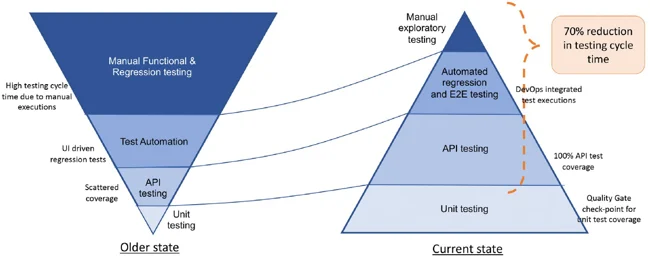Problem Statement
The client was trying to move from a manual regression testing environment towards a test automation pyramid during the implementation of Mule API’s, C# applications, and Drools rule where the primary emphasis is:
- To improve the slow turnaround (often weeks) for implementing changes and make them available for users
- Complement unit testing with some API / integration tests and UI based user journey tests
Solution Proposed
AdfarTech worked closely with the customer to assess and analyze their micro services-based system architecture. Based on the findings from the assessment, AdfarTech proposed and implemented a continuous testing model for code, API, and end-to-end regression testing.
- AdfarTech developed and implemented an automated flow to orchestrate integration from Dev to Ops. The team implemented two different pipelines for legacy and open system development. The legacy pipeline was implemented using Azure DevOps and the open system pipeline using Bamboo. API test automation framework was developed using Ready API and integrated with both the pipelines.
- Integrated performance and security testing was to be used early in the development life cycle. Akamai was used for performance testing and Vera code for security testing. Automated regression execution for nightly dev-build ensured code quality even before the start of functional testing.
Outcome – AdfarTech Advantage
Key outcomes and benefits for the customer includes:
- Reduction in time-to-market with on-demand release capabilities
- Increased API automation coverage to 100%
- 70% reduction in cycle time with DevOps driven build-deploy-test approach

